

Théorie des organisations. Un article de Wikipédia, l'encyclopédie libre.
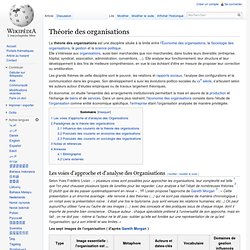
La théorie des organisations est une discipline située à la limite entre l'Économie des organisations, la Sociologie des organisations, la gestion et la science politique. Elle s'intéresse aux organisations, aussi bien marchandes que non-marchandes, dans toutes leurs diversités (entreprise, hôpital, syndicat, association, administration, conventions, ...). THEORIES DES ORGANISATIONS. Structuration des Mondes Sociaux (SMS) - Accueil SMS. New Organizing Institute. Research For Organizing - Home. Democratic Design - Principles.
After over a decade of research into what organizational democracy is, we've discovered the ten principles that it takes to cultivate a highly successful and sustainable democratic workplace.
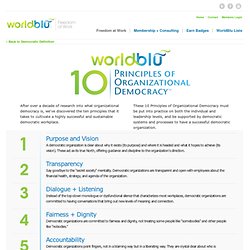
These 10 Principles of Organizational Democracy must be put into practice on both the individual and leadership levels, and be supported by democratic systems and processes to have a successful democratic organization. Purpose and Vision A democratic organization is clear about why it exists (its purpose) and where it is headed and what it hopes to achieve (its vision).
These act as its true North, offering guidance and discipline to the organization's direction. Transparency Say goodbye to the "secret society" mentality. Dialogue + Listening Instead of the top-down monologue or dysfunctional silence that characterizes most workplaces, democratic organizations are committed to having conversations that bring out new levels of meaning and connection. Fairness + Dignity Accountability. The 12 habits of highly collaborative organizations. Here are twelve collaboration patterns or "principles" that successful organizations follow.
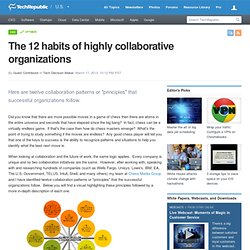
Did you know that there are more possible moves in a game of chess then there are atoms in the entire universe and seconds that have elapsed since the big bang? In fact, chess can be a virtually endless game. If that's the case then how do chess masters emerge? What's the point of trying to study something if the moves are endless? Any good chess player will tell you that one of the keys to success is the ability to recognize patterns and situations to help you identify what the best next move is. When looking at collaboration and the future of work, the same logic applies.
WebHome < Main < Open-org. Organizational structure. An organizational structure defines how activities such as task allocation, coordination and supervision are directed towards the achievement of organizational aims.[1] It can also be considered as the viewing glass or perspective through which individuals see their organization and its environment.[2] Organizations are a variant of clustered entities.
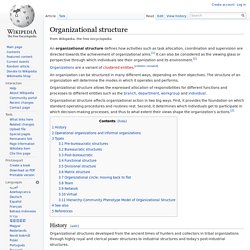
[citation needed] An organization can be structured in many different ways, depending on their objectives. The structure of an organization will determine the modes in which it operates and performs. Organizational structure affects organizational action in two big ways. History[edit] Organizational structures developed from the ancient times of hunters and collectors in tribal organizations through highly royal and clerical power structures to industrial structures and today's post-industrial structures. As pointed out by L. Gestion de projet. Principes généraux[modifier | modifier le code] Projets[modifier | modifier le code]

Structure for Collective Intelligent Organizations. Orgs Need 2B transformed.pdf. Management. Corporate Training Books. Master's Degree in Engineering and Management. Organizational learning. Organizational learning is an area of knowledge within organizational theory that studies models and theories about the way an organization learns and adapts (Vasenska, 2013:615).
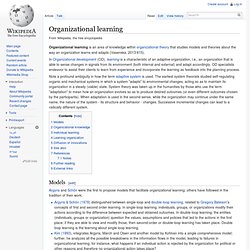
In Organizational development (OD), learning is a characteristic of an adaptive organization, i.e., an organization that is able to sense changes in signals from its environment (both internal and external) and adapt accordingly. OD specialists endeavor to assist their clients to learn from experience and incorporate the learning as feedback into the planning process. Note a profound ambiguity in how the term adaptive system is used. The earliest system theorists studied self-regulating organic and mechanical systems in which a system "adapts" to environmental changes, acting so as to maintain its organization in a steady (viable) state. Models[edit] Argyris and Schön were the first to propose models that facilitate organizational learning; others have followed in the tradition of their work: "Organizational learning" Groupware and Organizational Learning. Groupware and Organizational Learning by: Richard Karash[*] Copyright (c) 1995 Richard Karash May be reproduced for personal, non-commercial use.
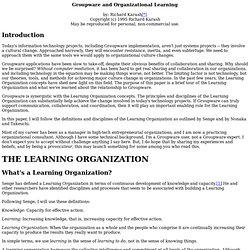
Introduction. Organisation scientifique du travail. Un article de Wikipédia, l'encyclopédie libre.
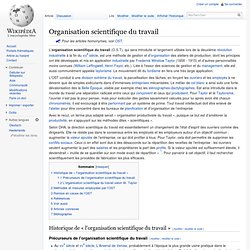
Pour les articles homonymes, voir OST. L'organisation scientifique du travail (O.S.T), qui sera introduite et largement utilisée lors de la deuxième révolution industrielle à la fin du XIXe siècle, est une méthode de gestion et d'organisation des ateliers de production, dont les principes ont été développés et mis en application industrielle par Frederick Winslow Taylor (1856 - 1915) et d'autres personnalités moins connues (William Leffingwell, Henri Fayol, etc.). Liée à l'essor des sciences de gestion et du management, elle est aussi communément appelée taylorisme. Le mouvement dit du fordisme en fera une très large application. L'OST conduit à une division extrême du travail, la parcellisation des tâches, en forçant les ouvriers et les employés à ne devenir que de simples exécutants dans d'immenses entreprises mécanisées. Fayolisme. Un article de Wikipédia, l'encyclopédie libre.
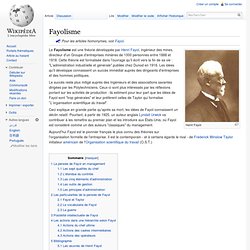
Pour les articles homonymes, voir Fayol. Henri Fayol Le Fayolisme est une théorie développée par Henri Fayol, ingénieur des mines, directeur d'un Groupe d'entreprises minières de 1000 personnes entre 1888 et 1918. Cette théorie est formalisée dans l'ouvrage qu'il écrit vers la fin de sa vie : "L'administration industrielle et générale" publiée chez Dunod en 1916. Organization theory (Castells) The theory of the Information Age is deeply rooted in organization theory.
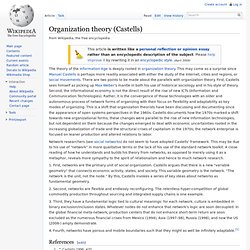
This may come as a surprise since Manuel Castells is perhaps more readily associated with either the study of the Internet, cities and regions, or social movements. There are two points to be made about the parallels with organization theory. First, Castells sees himself as picking up Max Weber’s mantle in both his use of historical sociology and in his style of theory. Second, the informational economy is not the direct result of the rise of new ICTs (Information and Communication Technologies). Gestion des ressources humaines. Un article de Wikipédia, l'encyclopédie libre.
La gestion des ressources humaines, ou GRH, anciennement dénommée gestion du personnel, recouvre l'ensemble des pratiques mises en œuvre pour administrer, mobiliser et développer les ressources humaines impliquées dans l'activité d'une organisation. Ces ressources humaines sont l'ensemble des collaborateurs de tous statuts (ouvriers, employés, cadres) appartenant à l'organisation mais aussi -et de plus en plus liés- à elle par des rapports de sujétion (ainsi les collaborateurs des sous-traitants sont considérés comme faisant partie de fait du périmètre des ressources humaines de l'entreprise)[1]. Enjeux[modifier | modifier le code] La motivation positive et la motivation négative ont chacune leur efficacité. Knowledge transfer. In organizational theory, knowledge transfer is the practical problem of transferring knowledge from one part of the organization to another. Like knowledge management, knowledge transfer seeks to organize, create, capture or distribute knowledge and ensure its availability for future users.
It is considered to be more than just a communication problem. If it were merely that, then a memorandum, an e-mail or a meeting would accomplish the knowledge transfer. Knowledge transfer is more complex because (1) knowledge resides in organizational members, tools, tasks, and their subnetworks[1] and (2) much knowledge in organizations is tacit or hard to articulate.[2] The subject has been taken up under the title of knowledge management since the 1990s. Background[edit] Argote & Ingram (2000) define knowledge transfer as "the process through which one unit (e.g., group, department, or division) is affected by the experience of another"[1] (p. 151). Catégorie:Outil de gestion des ressources humaines.
Organizational studies. Organizational studies is "the examination of how individuals construct organizational structures, processes, and practices and how these, in turn, shape social relations and create institutions that ultimately influence people".[1] Organizational studies comprise different areas that deal with the different aspects of the organizations, many of the approaches are functionalist but critical research also provide alternative frame for understanding in the field. Fundamental to the study of management is organizational change.[2] With the recent historical turn, there is growing interest in historical organization studies, promising a closer union between organizational and historical research whose validity derives from historical veracity and conceptual rigor, enhancing understanding of historical, contemporary and future-directed social realities.[3] Subfields[edit] Category:Organizational studies. Category:Organizational theory.
Sociologie des organisations. Catégorie:Sociologie des organisations. Axialent: Five Archetypes of Organizational Culture.